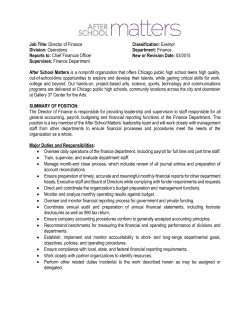
Brad L. LeVeck - faculty.ucmerced.edu
Brad L. LeVeck University of California, Merced 5200 N. Lake Road Merced, CA 95343 Positions 2014 – Present 2012 – 2014 2010 – 2014 Phone: (510) 604-0893 Email: bleveck@ucmerced.edu Web: http://faculty.ucmerced.edu/bleveck Assistant Professor, Department of Political Science, University of California, Merced Postdoctoral Research Fellow, Laboratory for International Law and Regulation, University of California, San Diego Director of Omnibus Political Science Study Laboratory, University of California, San Diego Education 2012 Ph.D. Political Science, University of California, San Diego 2004 B.A. Linguistics, Political Science, University of California, Berkeley Interests: experiments, models of political decision-making, strategic cognition and learning in games Dissertation: Coordination and Cognition in Parties Committee: James H. Fowler (Chair), Mathew D. McCubbins, Samuel Kernell, Craig R.M. McKenzie, Martin D. Paulus Publications: [* Equal contribution] 1. Kim, Henry A.* and Brad L. LeVeck*. Money, Reputation, and Incumbency in U.S. House Elections, or Why Marginals Have Become More Expensive. 2013. American Political Science Review. 107 (3): 492-504 2. Hafner-Burton, Emilie M.*, Brad L. LeVeck*, David G. Victor*, and James H. Fowler. 2014. Decision Makers’ Preferences for International Legal Cooperation. International Organization, 68: 845-876 3. Abdallah, Sherief, Rasha Sayed, Iyad Rahwan, Brad L. LeVeck, Manuel Cebrian, Alex Rutherford, and James H. Fowler. Corruption Drives the Emergence of Civil Society. 2014. Journal of The Royal Society Interface, 11(93): 1742-5662 4. LeVeck, Brad L., D. Alex Hughes, Emilie Hafner-Burton, James H. Fowler, and David G. Victor. 2014. “The Role of Self-Interest in Elite Bargaining.” Proceedings of the National Academy of Sciences of the United States of America 111(52): 18536–41 Last updated April 2015 1 Papers Under Review or in Revision: 1. Selective Attention to Public Signals in Coordination Games 2. Coordination, Learning, and Partisan Models of the Economy 3. Money That Pays: Party Reputation and the Marginal Utility of Incumbent Expenditures in Congressional Elections, with Henry Kim 4. The Declining Value of Moderation, with Henry Kim 5. Uncertainty and Compliance in International Cooperation, an Experimental Approach, with Emilie Hafner-Burton and David Victor 6. The Advantages of Group Decision Making in Crisis Bargaining: An Experiment, with Neil Narang Workshops: Santa Fe Institute Graduate Workshop in Computational Social Science Modeling and Complexity, Summer 2008 Presentations: Invited Talks 1. Uncertainty, Compliance, and Cooperation, with Emilie Hafner-Burton, David Victor. Conference on the Behavioral Revolution in International Relations, La Jolla CA. Jan 10, 2014 2. A Behavioral Approach to International Cooperation, with Emilie Hafner-Burton, David Victor. 3. The Ohio State University February 2013, University of Wisconsin, Madison February 2013, University of Texas February 2013, University of Pennsylvania October 2012, University of Rochester October 2012 4. Princeton Experimental Research Workshop: Best Practices and Applications, with Emilie Hafner-Burton. September 2012 Conference Presentations 1. “The Declining Value of Moderation” Annual Meeting of the Western Political Science Association, Las Vegas, NV, April 4, 2015. 2. “The Declining Value of Moderation” Annual Meeting of the American Political Science Association, Washington, D.C., August 30, 2014. 3. “The Role of Fairness in Elite Bargaining” Annual Meeting of the American Political Science Association, Washington, D.C., August 30, 2014. 4. “Paying the Cost of Toeing the Party Line”, Annual Meeting of the American Political Science Association, Chicago, IL, August 30, 2013. Last updated April 2015 2 5. “Uncertainty, Compliance and International Cooperation: An Experimental Approach”, Annual Meeting of the American Political Science Association, Chicago, IL, August 31, 2013. 6. “The Advantages of Group Decision Making in Crisis Bargaining”, Annual Meeting of the American Political Science Association, Chicago, IL, August 30, 2013. 7. “A Behavioral Approach to International Cooperation” Annual meeting of the International Political Economy Society, November 9, 2012 8. “The Advantages of Group Decision Making in Crisis Bargaining”, Annual Meeting of the Midwest Political Science Association, Chicago, IL, April 6, 2012. 9. “Coordination Incentives Can Explain Diverse and Simplistic Partisan Worldviews: an Experimental Test,” Annual Meeting of the American Political Science Association, Seattle, WA, Sept. 2, 2011. 10. “Are Partisans Overconfident about Issue Agreement? Using Betting to Distinguish Informed Guesses from Wishful Thinking,” Annual Meeting of the American Political Science Association, Washington D.C., September 4, 2010. 11. “How International Reputation Matters: Evidence from Bilateral Alliance Data 1919-2001,” UC Research on International Conflict and Cooperation IGCC SoCal Symposium, January 14, 2011 a. Annual Meeting of the American Political Science Association, Toronto, Canada, September 6, 2009. b. Annual Meeting of the Midwest Political Science Association, Chicago, IL, April 4, 2009. c. Annual Meeting of the American Political Science Association, Boston, MA August 30, 2008. 12. “Who’s Blaming Whom? Pitfalls of Bargaining before Multiple Audiences”, Annual Meeting of the Midwest Political Science Association, Chicago, IL, April 6, 2008. 13. “Issue Salience and Party Labels in Elections”, Annual Meeting of the Midwest Political Science Association, Chicago, IL, April 6, 2008. Discussant/Chair Annual Meeting of the Western Political Science Association. Las Vegas, NV. Panel on Electoral Reward and Punishment. April1, 2014 2nd Meeting on the Behavioral Revolution in International Relations, La Jolla CA. June 20, 2014 Conference on the Behavioral Revolution in International Relations, La Jolla CA. Jan 10, 2014 USC Conference on Empirical Legal Studies, Los Angeles, CA. November 20, 2009. NSF Conference on Politics Experiments, Charlottesville, VA. May 19, 2010 Last updated April 2015 3 Teaching: UC Merced Poli 190: Experimental Game Theory (Fall 2014, Undergraduate) Poli 210b: Intro To Quantitative Analysis and Inference (Fall 2014, Graduate) UCSD Poli 140c: International Crisis Diplomacy, co-taught with Neil Narang (Summer 2010) Fellowships and Awards: Public Policy and Biological Threats Fellowship: Funded by Carnegie Corporation 2005 Jack E. Riley Scholarship 2001-2003 Service: Professional Associations American Political Science Association Midwest Political Science Association Western Political Science Association Reviewer American Politics Research American Political Science Review Climactic Change International Interactions Journal of Conflict Resolution Journal of Politics Journal of Theoretical Biology Nature Climate Change Political Behavior Departmental Service UC Merced Lab Committee (2014-present) UC Merced Graduate Exam Committee (2014-present) Last updated April 2015 4
© Copyright 2024










